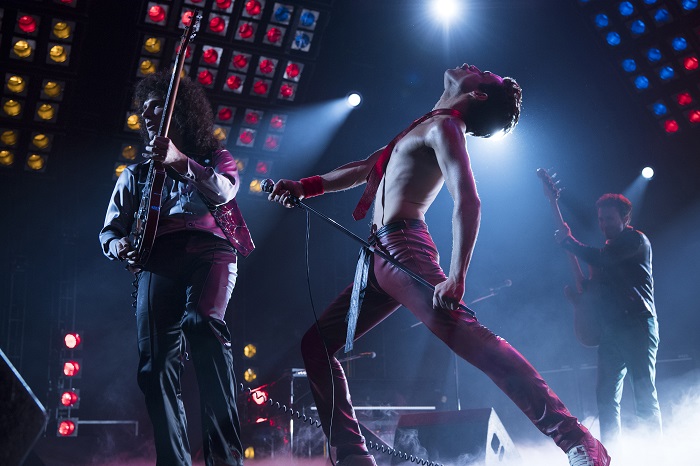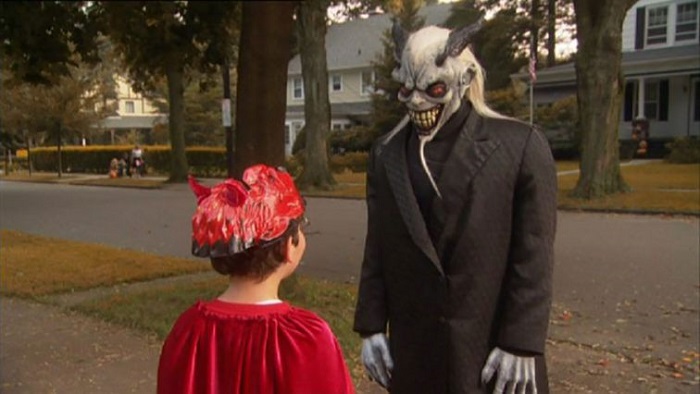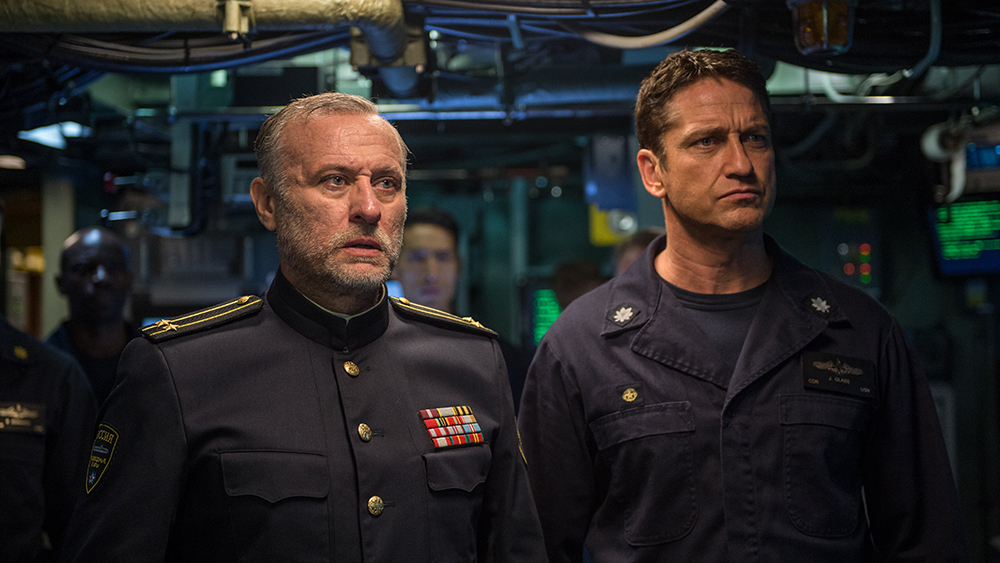
'Bohemian Rhapsody' Review
An entertaining, albeit very safe, biopic about the legendary Freddie Mercury.
Release Date: November 2, 2018
MPAA Rating: PG-13
Bohemian Rhapsody chronicles the years leading up to Queen’s legendary appearance at the Live Aid concert.
Director: Bryan Singer
Screenwriter(s): Anthony McCarten
Cast: Rami Malek (Freddie Mercury), Lucy Boynton (Mary Austin), Gwilym Lee (Brian May), Ben Hardy (Roger Taylor), Joseph Mazzello (John Deacon), Aidan Gillen (John Reid), Allen Leech (Paul Prenter), Tom Hollander (Jim Beach), Mike Myers (Ray Foster)
Producer(s): Jim Beach, Graham King
Cinematographer: Newton Thomas Sigel
Editor: John Ottman
Casting Director: Susie Figgis
Production Designer: Aaron Haye
Costume Designer: Julian Day
Production

Back in the innocent summer of 2001, there was a VH1 original movie about Def Leppard called, appropriately enough, Hysteria: The Def Leppard Story. It featured the music of Def Leppard being framed by awkward performances from actors in wigs telling the story of one of hard rock’s most beloved bands. Substitute the music of Def Leppard for Queen, and you’ve got Bohemian Rhapsody.
Just as one might suspect, Bohemian Rhapsody follows the rise and fall and rise again of the influential rock band Queen. It shows legendary frontman Freddie Mercury (Rami Malek from Papillon and Short Term 12) talking his way into the band with guitarist Brian May (Gwilym Lee from “Jamestown”) and drummer Roger Taylor (X-Men: Apocalypse’s Ben Hardy), and the addition of bassist John Deacon (The Social Network’s Joe Mazzello) that completed the classic Queen lineup. It shows the songwriting, recording, and touring side of the band. It also delves a little into Mercury’s personal life, covering his struggles with his sexuality and his marriage to his best friend, Mary Austin (Lucy Boynton from Sing Street and The Blackcoat’s Daughter). And that is the big problem with Bohemian Rhapsody. It delves too little into it, and what is shown onscreen is very safe and sterile.

The real Brian May and Roger Taylor served as executive producers for the film, and it almost seems as if they are overprotective of both Freddie’s public image as well as their own. The screenplay, written by Andrew McCarten (The Theory of Everything, Darkest Hour) and Peter Morgan (“The Crown”), glosses over the more controversial aspects of Mercury’s life, most of which, like his homosexuality and drug experimentation, are common public knowledge. So, while watching the band write and perform all of their greatest hits is fun, Bohemian Rhapsody becomes just another fanboy depiction of a legendary band. Of course, the specter of AIDS hangs over the entire movie, partly in background scenes and partly because the audience knows how things end for Freddie, but the movie seems to want to be more of a good-time movie than a down-to-earth, real-life dramatic biopic.
Production of Bohemian Rhapsody was more contentious than the finished film, with credited director Bryan Singer (Apt Pupil, The X-Men movies) either resigning or being ousted from the project (depending upon who you ask) halfway through shooting. He was replaced by executive producer Dexter Fletcher (who is also helming the upcoming Rocketman), and there seems to be a disconnect between the two visions. Bohemian Rhapsody hints at what the audience wants to see, showing Freddie making eye contact with a trucker heading into a restroom or throwing a wild costume party at his new mansion (at which his bandmates are visibly uncomfortable), but these parts of the singer’s life are downplayed as mere glimpses of the artist in between bouts of rocking.

Hardcore Queen fans may have a fit with Bohemian Rhapsody, as the film plays havoc with the band’s timeline. Some things are just nitpicky, such as when the band is shown writing “We Will Rock You” in 1980 when the song was released in 1977 (1980 was “Another One Bites the Dust” territory). Others are purely for emotional manipulation, like showing Freddie’s HIV diagnosis before Live Aid when it actually happened a couple of years later in real life. These inconsistencies may make the movie more cinematic, but it’s annoying for those who remember it in real time.
As a movie, Bohemian Rhapsody is fine. Malek’s performance would be star-making if it didn’t feel like he was trying to talk with a cheap set of Halloween vampire teeth in his mouth the whole time. The story is entertaining enough, even if it feels a bit one-sided and full of idolatry. It just lacks the bite of, say, a Straight Outta Compton or a Sid and Nancy. It’s enjoyable, but disposable, and that’s a shame, because a band as important as Queen deserves a movie that does them justice, and Bohemian Rhapsody only superficially cuts it.

Score and Soundtrack

To put it bluntly, the music in Bohemian Rhapsody freaking rocks. But that’s to be expected when the source material is the catalog of a band as innovative and influential as Queen. The soundtrack sticks mostly to the FM radio singalong hits, with a handful of deep cuts shoehorned into background scenes for good measure. Because Brian May and Roger Taylor were on board, the movie had access to the master tapes, so there’s no cover band feel to the songs. The tracks themselves are a combination of the original Queen recordings, the actor’s own voices, and a soundalike musical “stuntman” named Marc Martel who did much of the heavy vocal lifting (and is, unsurprisingly, the singer of a Queen tribute act). While the lead vocals are an amalgamation of three different people, the audience’s ears hear only Freddie Mercury. Just as it should be.

The best thing that Bohemian Rhapsody does as a movie is end on the perfect note. The final scene is Queen’s legendary Live Aid performance, and that’s the only way the film should end. Everyone knows the rest (and those who may not are enlightened by a title card epilogue), so Bohemian Rhapsody keeps the blood pumping with a precise re-creation of a brilliant moment in musical history. And it makes sure that the audience leaves the theater singing “Radio Ga Ga.”


